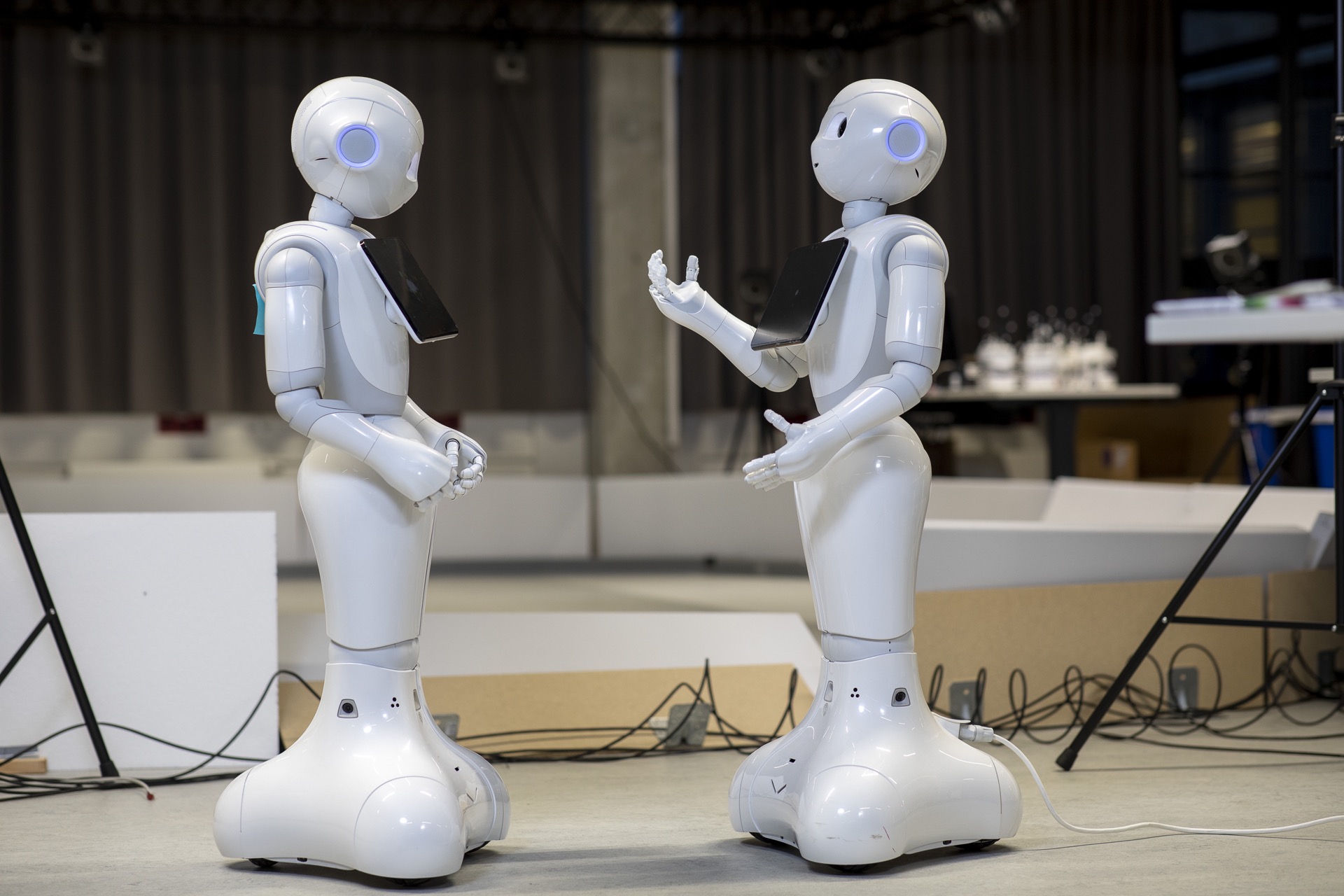Social responsiveness and its effects on learning in human-human and human- robot interaction

©SCIoI
How can we interact with a student to support effective knowledge transfer? Research in educational psychology describes social responsiveness as a central prerequisite of effective knowledge transfer in human-human interaction (Aldrup et al., 2020). In educational research, social responsiveness is often discussed with respect to a teacher’s ability to accurately read a learner’s signals and appropriately react to them.
However, our understanding of social responsive behaviors in social interaction is limited to some broad categories. Understanding and appropriately reacting to social cues facilitate effective knowledge transfer between interaction partners, whether they be humans or humans and an artificial agent. Research on human-robot interaction showed that system responsiveness increases overall system acceptance by human interaction partners – a central precondition for knowledge transfer (Cavedon et al. 2015; Rzepka & Berger, 2018). However, research on the robots that perceive and react to human behavior often does not consider learning situations (Pattar et al., 2019).
The main goal of this project therefore is to develop artificial systems with high-level perceptual capabilities in social learning situations and, in the course of that, systems that are able to simulate social responsive behaviors. A social responsive synthetic system should be able to perceive, identify and react to social cues and learn within this interaction process as responsiveness serves as a shortcut to reduce the complexity of communication with humans. Combining principles from computer vision and educational psychology, we will use video data of learning situations to identify key principles of socially responsive behaviors in humans. Understanding these key principles will enable us in turn to develop socially responsive artificial systems.
Related Publications +
2756394
proj031
1
apa
50
creator
desc
year
20203
https://www.scienceofintelligence.de/wp-content/plugins/zotpress/
%7B%22status%22%3A%22success%22%2C%22updateneeded%22%3Afalse%2C%22instance%22%3Afalse%2C%22meta%22%3A%7B%22request_last%22%3A0%2C%22request_next%22%3A0%2C%22used_cache%22%3Atrue%7D%2C%22data%22%3A%5B%7B%22key%22%3A%22XHEREWQD%22%2C%22library%22%3A%7B%22id%22%3A2756394%7D%2C%22meta%22%3A%7B%22creatorSummary%22%3A%22Petkovi%5Cu0107%20et%20al.%22%2C%22parsedDate%22%3A%222025%22%2C%22numChildren%22%3A0%7D%2C%22bib%22%3A%22%26lt%3Bdiv%20class%3D%26quot%3Bcsl-bib-body%26quot%3B%20style%3D%26quot%3Bline-height%3A%202%3B%20padding-left%3A%201em%3B%20text-indent%3A-1em%3B%26quot%3B%26gt%3B%5Cn%20%20%26lt%3Bdiv%20class%3D%26quot%3Bcsl-entry%26quot%3B%26gt%3BPetkovi%26%23x107%3B%2C%20U.%2C%20Frenkel%2C%20J.%2C%20Hellwich%2C%20O.%2C%20%26amp%3B%20Lazarides%2C%20R.%20%282025%29.%20Modeling%20Teacher%20Nonverbal%20Immediacy%3A%20Refinement%20and%20Analysis.%20%26lt%3Bi%26gt%3BAdaptive%20Behavior%26lt%3B%5C%2Fi%26gt%3B.%20%26lt%3Ba%20class%3D%26%23039%3Bzp-DOIURL%26%23039%3B%20href%3D%26%23039%3Bhttps%3A%5C%2F%5C%2Fdoi.org%5C%2F10.1177%5C%2F10597123251374920%26%23039%3B%26gt%3Bhttps%3A%5C%2F%5C%2Fdoi.org%5C%2F10.1177%5C%2F10597123251374920%26lt%3B%5C%2Fa%26gt%3B%26lt%3B%5C%2Fdiv%26gt%3B%5Cn%26lt%3B%5C%2Fdiv%26gt%3B%22%2C%22data%22%3A%7B%22itemType%22%3A%22journalArticle%22%2C%22title%22%3A%22Modeling%20Teacher%20Nonverbal%20Immediacy%3A%20Refinement%20and%20Analysis%22%2C%22creators%22%3A%5B%7B%22creatorType%22%3A%22author%22%2C%22firstName%22%3A%22Uro%5Cu0161%22%2C%22lastName%22%3A%22Petkovi%5Cu0107%22%7D%2C%7B%22creatorType%22%3A%22author%22%2C%22firstName%22%3A%22Jonas%22%2C%22lastName%22%3A%22Frenkel%22%7D%2C%7B%22creatorType%22%3A%22author%22%2C%22firstName%22%3A%22Olaf%22%2C%22lastName%22%3A%22Hellwich%22%7D%2C%7B%22creatorType%22%3A%22author%22%2C%22firstName%22%3A%22Rebecca%22%2C%22lastName%22%3A%22Lazarides%22%7D%5D%2C%22abstractNote%22%3A%22%22%2C%22date%22%3A%222025%22%2C%22section%22%3A%22%22%2C%22partNumber%22%3A%22%22%2C%22partTitle%22%3A%22%22%2C%22DOI%22%3A%2210.1177%5C%2F10597123251374920%22%2C%22citationKey%22%3A%22%22%2C%22url%22%3A%22https%3A%5C%2F%5C%2Fjournals.sagepub.com%5C%2Fdoi%5C%2F10.1177%5C%2F10597123251374920%22%2C%22PMID%22%3A%22%22%2C%22PMCID%22%3A%22%22%2C%22ISSN%22%3A%22%22%2C%22language%22%3A%22%22%2C%22collections%22%3A%5B%5D%2C%22dateModified%22%3A%222025-09-26T13%3A16%3A18Z%22%7D%7D%2C%7B%22key%22%3A%22WNJRQWKQ%22%2C%22library%22%3A%7B%22id%22%3A2756394%7D%2C%22meta%22%3A%7B%22creatorSummary%22%3A%22Petkovic%20et%20al.%22%2C%22parsedDate%22%3A%222024%22%2C%22numChildren%22%3A1%7D%2C%22bib%22%3A%22%26lt%3Bdiv%20class%3D%26quot%3Bcsl-bib-body%26quot%3B%20style%3D%26quot%3Bline-height%3A%202%3B%20padding-left%3A%201em%3B%20text-indent%3A-1em%3B%26quot%3B%26gt%3B%5Cn%20%20%26lt%3Bdiv%20class%3D%26quot%3Bcsl-entry%26quot%3B%26gt%3BPetkovic%2C%20U.%2C%20Frenkel%2C%20J.%2C%20Hellwich%2C%20O.%2C%20%26amp%3B%20Lazarides%2C%20R.%20%282024%29.%20Advancing%20Nonverbal%20Immediacy%20Analysis%20in%20Education%3A%20A%20Multimodal%20Computational%20Model%20Approach.%20%26lt%3Bi%26gt%3BConference%20on%20the%20Simulation%20of%20Adaptive%20Behavior%20%28SAB%29%26lt%3B%5C%2Fi%26gt%3B%2C%20326%26%23x2013%3B338.%20%26lt%3Ba%20class%3D%26%23039%3Bzp-ItemURL%26%23039%3B%20href%3D%26%23039%3Bhttps%3A%5C%2F%5C%2Fdoi.org%5C%2F10.1007%5C%2F978-3-031-71533-4_26%26%23039%3B%26gt%3Bhttps%3A%5C%2F%5C%2Fdoi.org%5C%2F10.1007%5C%2F978-3-031-71533-4_26%26lt%3B%5C%2Fa%26gt%3B%26lt%3B%5C%2Fdiv%26gt%3B%5Cn%26lt%3B%5C%2Fdiv%26gt%3B%22%2C%22data%22%3A%7B%22itemType%22%3A%22conferencePaper%22%2C%22title%22%3A%22Advancing%20Nonverbal%20Immediacy%20Analysis%20in%20Education%3A%20A%20Multimodal%20Computational%20Model%20Approach%22%2C%22creators%22%3A%5B%7B%22creatorType%22%3A%22author%22%2C%22firstName%22%3A%22Uros%22%2C%22lastName%22%3A%22Petkovic%22%7D%2C%7B%22creatorType%22%3A%22author%22%2C%22firstName%22%3A%22Jonas%22%2C%22lastName%22%3A%22Frenkel%22%7D%2C%7B%22creatorType%22%3A%22author%22%2C%22firstName%22%3A%22Olaf%22%2C%22lastName%22%3A%22Hellwich%22%7D%2C%7B%22creatorType%22%3A%22author%22%2C%22firstName%22%3A%22Rebecca%22%2C%22lastName%22%3A%22Lazarides%22%7D%5D%2C%22abstractNote%22%3A%22%22%2C%22proceedingsTitle%22%3A%22Conference%20on%20the%20Simulation%20of%20Adaptive%20Behavior%20%28SAB%29%22%2C%22conferenceName%22%3A%22%22%2C%22date%22%3A%222024%22%2C%22eventPlace%22%3A%22%22%2C%22DOI%22%3A%2210.1007%5C%2F978-3-031-71533-4_26%22%2C%22ISBN%22%3A%22%22%2C%22citationKey%22%3A%22%22%2C%22url%22%3A%22https%3A%5C%2F%5C%2Fdoi.org%5C%2F10.1007%5C%2F978-3-031-71533-4_26%22%2C%22ISSN%22%3A%22%22%2C%22language%22%3A%22%22%2C%22collections%22%3A%5B%5D%2C%22dateModified%22%3A%222025-09-26T13%3A16%3A16Z%22%7D%7D%2C%7B%22key%22%3A%22IMYCSQ5M%22%2C%22library%22%3A%7B%22id%22%3A2756394%7D%2C%22meta%22%3A%7B%22creatorSummary%22%3A%22Lazarides%20et%20al.%22%2C%22parsedDate%22%3A%222025%22%2C%22numChildren%22%3A0%7D%2C%22bib%22%3A%22%26lt%3Bdiv%20class%3D%26quot%3Bcsl-bib-body%26quot%3B%20style%3D%26quot%3Bline-height%3A%202%3B%20padding-left%3A%201em%3B%20text-indent%3A-1em%3B%26quot%3B%26gt%3B%5Cn%20%20%26lt%3Bdiv%20class%3D%26quot%3Bcsl-entry%26quot%3B%26gt%3BLazarides%2C%20R.%2C%20Frenkel%2C%20J.%2C%20G%26%23xF6%3Bllner%2C%20R.%2C%20Petkovic%2C%20U.%2C%20%26amp%3B%20Hellwich%2C%20O.%20%282025%29.%20%26%23x2018%3BNo%20words%26%23x2019%3B%26%23x2014%3BMachine-learning%20classified%20nonverbal%20immediacy%20and%20its%20role%20in%20connecting%20teacher%20self-efficacy%20with%20perceived%20teaching%20and%20student%20interest.%20%26lt%3Bi%26gt%3BBritish%20Journal%20of%20Educational%20Psychology%26lt%3B%5C%2Fi%26gt%3B.%20%26lt%3Ba%20class%3D%26%23039%3Bzp-DOIURL%26%23039%3B%20href%3D%26%23039%3Bhttps%3A%5C%2F%5C%2Fdoi.org%5C%2F10.1111%5C%2Fbjep.12732%26%23039%3B%26gt%3Bhttps%3A%5C%2F%5C%2Fdoi.org%5C%2F10.1111%5C%2Fbjep.12732%26lt%3B%5C%2Fa%26gt%3B%26lt%3B%5C%2Fdiv%26gt%3B%5Cn%26lt%3B%5C%2Fdiv%26gt%3B%22%2C%22data%22%3A%7B%22itemType%22%3A%22journalArticle%22%2C%22title%22%3A%22%5Cu2018No%20words%5Cu2019%5Cu2014Machine-learning%20classified%20nonverbal%20immediacy%20and%20its%20role%20in%20connecting%20teacher%20self-efficacy%20with%20perceived%20teaching%20and%20student%20interest.%22%2C%22creators%22%3A%5B%7B%22creatorType%22%3A%22author%22%2C%22firstName%22%3A%22Rebecca%22%2C%22lastName%22%3A%22Lazarides%22%7D%2C%7B%22creatorType%22%3A%22author%22%2C%22firstName%22%3A%22Jonas%22%2C%22lastName%22%3A%22Frenkel%22%7D%2C%7B%22creatorType%22%3A%22author%22%2C%22firstName%22%3A%22Richard%22%2C%22lastName%22%3A%22G%5Cu00f6llner%22%7D%2C%7B%22creatorType%22%3A%22author%22%2C%22firstName%22%3A%22Uros%22%2C%22lastName%22%3A%22Petkovic%22%7D%2C%7B%22creatorType%22%3A%22author%22%2C%22firstName%22%3A%22Olaf%22%2C%22lastName%22%3A%22Hellwich%22%7D%5D%2C%22abstractNote%22%3A%22%22%2C%22date%22%3A%222025%22%2C%22section%22%3A%22%22%2C%22partNumber%22%3A%22%22%2C%22partTitle%22%3A%22%22%2C%22DOI%22%3A%2210.1111%5C%2Fbjep.12732%22%2C%22citationKey%22%3A%22%22%2C%22url%22%3A%22%22%2C%22PMID%22%3A%22%22%2C%22PMCID%22%3A%22%22%2C%22ISSN%22%3A%22%22%2C%22language%22%3A%22%22%2C%22collections%22%3A%5B%5D%2C%22dateModified%22%3A%222025-09-26T13%3A16%3A16Z%22%7D%7D%2C%7B%22key%22%3A%22IKHQNBUY%22%2C%22library%22%3A%7B%22id%22%3A2756394%7D%2C%22meta%22%3A%7B%22creatorSummary%22%3A%22Frenkel%20et%20al.%22%2C%22parsedDate%22%3A%222024%22%2C%22numChildren%22%3A1%7D%2C%22bib%22%3A%22%26lt%3Bdiv%20class%3D%26quot%3Bcsl-bib-body%26quot%3B%20style%3D%26quot%3Bline-height%3A%202%3B%20padding-left%3A%201em%3B%20text-indent%3A-1em%3B%26quot%3B%26gt%3B%5Cn%20%20%26lt%3Bdiv%20class%3D%26quot%3Bcsl-entry%26quot%3B%26gt%3BFrenkel%2C%20J.%2C%20Cajar%2C%20A.%2C%20Engbert%2C%20R.%2C%20%26amp%3B%20Lazarides%2C%20R.%20%282024%29.%20Exploring%20the%20Impact%20of%20Nonverbal%20Social%20Behavior%20on%20Learning%20Outcomes%20in%20Instructional%20Video%20Design.%20%26lt%3Bi%26gt%3BScientific%20Reports%26lt%3B%5C%2Fi%26gt%3B.%20%26lt%3Ba%20class%3D%26%23039%3Bzp-DOIURL%26%23039%3B%20href%3D%26%23039%3Bhttps%3A%5C%2F%5C%2Fdoi.org%5C%2F10.1038%5C%2Fs41598-024-63487-w%26%23039%3B%26gt%3Bhttps%3A%5C%2F%5C%2Fdoi.org%5C%2F10.1038%5C%2Fs41598-024-63487-w%26lt%3B%5C%2Fa%26gt%3B%26lt%3B%5C%2Fdiv%26gt%3B%5Cn%26lt%3B%5C%2Fdiv%26gt%3B%22%2C%22data%22%3A%7B%22itemType%22%3A%22journalArticle%22%2C%22title%22%3A%22Exploring%20the%20Impact%20of%20Nonverbal%20Social%20Behavior%20on%20Learning%20Outcomes%20in%20Instructional%20Video%20Design%22%2C%22creators%22%3A%5B%7B%22creatorType%22%3A%22author%22%2C%22firstName%22%3A%22Jonas%22%2C%22lastName%22%3A%22Frenkel%22%7D%2C%7B%22creatorType%22%3A%22author%22%2C%22firstName%22%3A%22Anke%22%2C%22lastName%22%3A%22Cajar%22%7D%2C%7B%22creatorType%22%3A%22author%22%2C%22firstName%22%3A%22Ralf%22%2C%22lastName%22%3A%22Engbert%22%7D%2C%7B%22creatorType%22%3A%22author%22%2C%22firstName%22%3A%22Rebecca%22%2C%22lastName%22%3A%22Lazarides%22%7D%5D%2C%22abstractNote%22%3A%22%22%2C%22date%22%3A%222024%22%2C%22section%22%3A%22%22%2C%22partNumber%22%3A%22%22%2C%22partTitle%22%3A%22%22%2C%22DOI%22%3A%2210.1038%5C%2Fs41598-024-63487-w%22%2C%22citationKey%22%3A%22%22%2C%22url%22%3A%22https%3A%5C%2F%5C%2Fwww.nature.com%5C%2Farticles%5C%2Fs41598-024-63487-w%22%2C%22PMID%22%3A%22%22%2C%22PMCID%22%3A%22%22%2C%22ISSN%22%3A%22%22%2C%22language%22%3A%22%22%2C%22collections%22%3A%5B%5D%2C%22dateModified%22%3A%222025-09-26T13%3A16%3A16Z%22%7D%7D%5D%7D
Petković, U., Frenkel, J., Hellwich, O., & Lazarides, R. (2025). Modeling Teacher Nonverbal Immediacy: Refinement and Analysis.
Adaptive Behavior.
https://doi.org/10.1177/10597123251374920
Petkovic, U., Frenkel, J., Hellwich, O., & Lazarides, R. (2024). Advancing Nonverbal Immediacy Analysis in Education: A Multimodal Computational Model Approach.
Conference on the Simulation of Adaptive Behavior (SAB), 326–338.
https://doi.org/10.1007/978-3-031-71533-4_26
Lazarides, R., Frenkel, J., Göllner, R., Petkovic, U., & Hellwich, O. (2025). ‘No words’—Machine-learning classified nonverbal immediacy and its role in connecting teacher self-efficacy with perceived teaching and student interest.
British Journal of Educational Psychology.
https://doi.org/10.1111/bjep.12732
Frenkel, J., Cajar, A., Engbert, R., & Lazarides, R. (2024). Exploring the Impact of Nonverbal Social Behavior on Learning Outcomes in Instructional Video Design.
Scientific Reports.
https://doi.org/10.1038/s41598-024-63487-w





